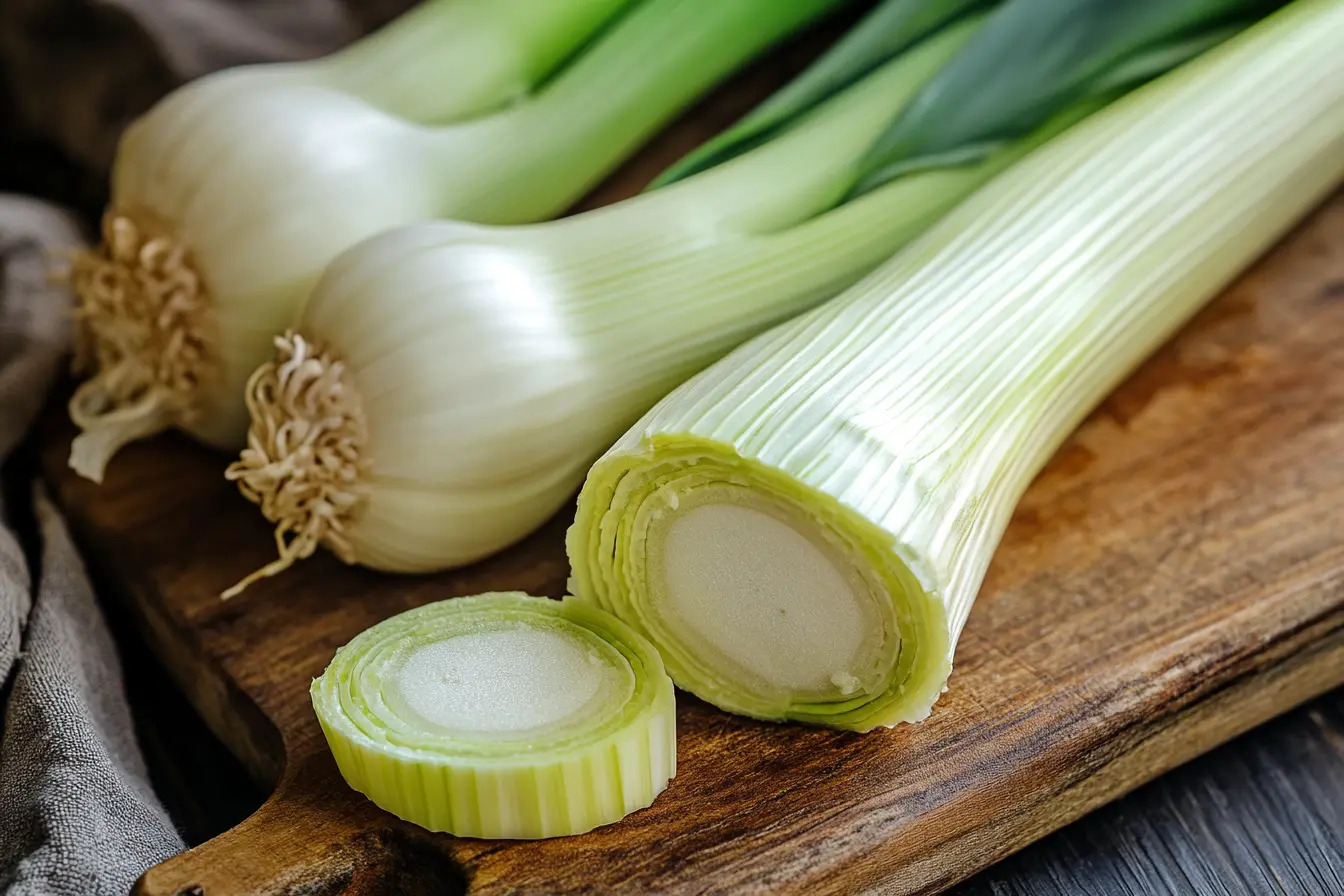Leeks are more than just a mild-flavored vegetable; they are a nutritional powerhouse that can greatly enhance the health benefits of your meals, especially soups. Whether you’re an experienced cook or just getting started in the kitchen, understanding the benefits of leeks in soup can help you make healthier choices. From supporting heart health to aiding in weight management, leeks are a fantastic ingredient to include in your diet.
In this article, we’ll explore the many health benefits of leeks, their nutritional profile, and how they can be incorporated into various soup recipes. By the end, you’ll see why leeks deserve a place in your pantry.
The Nutritional Value of Leeks in Soup: Why They’re a Superfood
Leeks belong to the allium family, which includes garlic, onions, and shallots. Despite their subtle taste, leeks pack a punch when it comes to nutrition. They are low in calories but high in essential vitamins and minerals, making them a superfood in their own right.
Key Nutrients in Leeks:
- Vitamins: Leeks are rich in vitamins A, C, and K, which are crucial for immune function, skin health, and blood clotting.
- Vitamin A: Supports healthy vision, immune function, and cell growth.
- Vitamin C: Known for its immune-boosting properties, it also plays a role in skin health by aiding in collagen production.
- Vitamin K: Essential for bone health and blood clotting.
- Minerals: Leeks contain essential minerals like iron, magnesium, and manganese, all of which contribute to energy production, bone health, and enzyme function.
- Iron: Helps in oxygen transportation in the blood, preventing fatigue.
- Magnesium: Supports muscle and nerve function, along with regulating blood pressure.
- Manganese: Plays a role in metabolism, bone health, and antioxidant function.
- Phytochemicals: Leeks are a good source of kaempferol, a potent antioxidant that helps fight oxidative stress, reduce inflammation, and lower the risk of chronic diseases. This flavonoid has been shown to provide protection against heart disease, certain cancers, and inflammatory conditions.
One serving of leeks (about 100 grams) contains only 61 calories, making them an ideal ingredient for soups, particularly if you’re looking to manage your weight without sacrificing flavor or nutrition. Their low caloric content combined with high fiber makes leeks a satiating, nutrient-dense option for any meal.
How Leeks in Soup Support Heart Health: Lower Cholesterol and Blood Pressure
One of the most well-known benefits of leeks in soup is their positive impact on heart health. Leeks can improve various aspects of cardiovascular health due to their nutrient content and specific bioactive compounds. Here’s how adding leeks to your soup can help keep your cardiovascular system in check.
1. Lowering Blood Pressure
Leeks contain kaempferol, which has been shown to help lower blood pressure by promoting the relaxation of blood vessels and reducing the risk of hypertension. Maintaining healthy blood pressure is crucial for preventing heart disease, strokes, and other cardiovascular issues.
2. Cholesterol Management
The sulfur compounds in leeks, similar to those found in garlic, can help reduce levels of bad cholesterol (LDL). This not only reduces the risk of heart disease but also prevents the buildup of plaque in arteries, which can lead to atherosclerosis—a condition where plaque narrows and hardens the arteries, restricting blood flow.
3. Folate and Heart Health
Folate is another important nutrient found in leeks, and it plays a significant role in regulating homocysteine levels, an amino acid linked to a higher risk of heart disease when present in high amounts. Keeping homocysteine levels in check through a diet rich in folate can support long-term heart health and reduce the likelihood of heart attacks and strokes.
Learn more about heart-healthy ingredients in this comprehensive guide to nutritious salads.
Leeks Soup Benefits for Digestive Health: Prebiotics and Fiber
A healthy digestive system is crucial for overall well-being, and leeks can play a significant role in improving digestive health. This is mainly due to their high content of prebiotics, which are fibers that feed the good bacteria in your gut. A healthy gut is essential not only for digestion but also for immune function and mental health.
1. Promoting Healthy Gut Bacteria
Leeks are rich in prebiotic fibers, which serve as food for beneficial gut bacteria, particularly bifidobacteria and lactobacilli. These bacteria help break down food, synthesize vitamins, and protect against harmful pathogens. By consuming foods high in prebiotics, like leeks, you can promote a healthy, balanced gut microbiome, which is essential for optimal digestion and overall health.
2. Preventing Bloating and Constipation
The fiber in leeks adds bulk to the stool, aiding in digestion and preventing bloating and constipation. Insoluble fiber helps keep things moving smoothly through the digestive tract, while soluble fiber absorbs water, making stool easier to pass. By adding leeks to your soups, you’re not only enhancing flavor but also supporting a healthy digestive system.
Additionally, a diet rich in prebiotics has been linked to reduced inflammation in the gut, which can alleviate symptoms of conditions like irritable bowel syndrome (IBS) and inflammatory bowel disease (IBD).
For more information on digestive health, check out this comprehensive guide on cooking healthy foods.
Leeks in Soup for Cancer Prevention: Antioxidant and Anti-Cancer Properties
Leeks are packed with allyl sulfides, compounds known for their cancer-fighting properties. Including leeks in your soups may help reduce the risk of certain cancers, particularly those affecting the prostate, colon, and stomach.
1. Reducing Cancer Risk
Studies suggest that the allyl sulfides in leeks can inhibit the growth of cancer cells, making them a valuable part of a cancer-prevention diet. These compounds are thought to interfere with the formation of cancerous cells and reduce the proliferation of existing cancer cells, particularly in organs like the prostate, stomach, and colon.
2. Antioxidant Power
Leeks are high in antioxidants like vitamin C and kaempferol, both of which protect your cells from damage that can lead to cancer. The antioxidants work by neutralizing free radicals, which can otherwise harm cells and contribute to cancer development. Including leeks in your diet regularly can offer a layer of protection against oxidative damage and reduce your overall risk of cancer.
Bone Health: Strengthening Your Skeletal System
In addition to their heart and digestive benefits, leeks also contribute to bone health. Here’s how they can help keep your bones strong:
1. Calcium and Magnesium
Leeks are a good source of calcium and magnesium, two minerals essential for bone strength and health. Both calcium and magnesium work together to support bone density and prevent conditions like osteoporosis. These minerals play a vital role in the structural integrity of bones and are necessary for maintaining the balance of minerals in the bloodstream.
2. Vitamin K
Vitamin K, found abundantly in leeks, is critical for bone metabolism. It helps regulate calcium levels in the body, ensuring that calcium is effectively used to maintain bone density. Vitamin K works by activating proteins that help bind calcium to the bones, making them stronger and less prone to fractures.
Leeks for Weight Loss: A Low-Calorie, High-Fiber Superfood
If you’re looking to manage your weight, leeks are an excellent addition to your diet, especially in soups. They provide essential nutrients while being low in calories and fat, making them a perfect food for anyone aiming to lose or maintain weight.
1. Low-Calorie Content
Leeks are very low in calories, with just 61 calories per 100 grams, making them a perfect ingredient for anyone on a weight-loss journey. They provide essential nutrients without contributing to calorie overload, allowing you to enjoy larger portions without exceeding your daily caloric needs.
2. Boosting Metabolism and Satiety
The fiber in leeks not only helps with digestion but also promotes feelings of fullness, which can prevent overeating. Soluble fiber forms a gel-like substance in the stomach, slowing down digestion and helping you feel satisfied for longer periods. A fiber-rich diet, including leeks, can help boost metabolism, improve blood sugar regulation, and support weight management.
For a delicious weight-loss-friendly meal, try this healthy leek and beef soup recipe.
Immune System Support: Strengthening Your Body’s Defenses
Leeks can also help boost your immune system thanks to their high content of vitamin C and other antioxidants.
1. Vitamin C for Immune Health
Vitamin C is vital for maintaining a strong immune system, helping your body fight off infections and illnesses. It enhances the production of white blood cells, which are essential for fighting off pathogens. Regular consumption of leeks can provide a good dose of vitamin C to keep your immune system functioning at its best, especially during cold and flu season.
2. Antioxidants and Immune Function
The antioxidants in leeks, including kaempferol and polyphenols, play a key role in preventing illness by protecting your cells from oxidative damage. These compounds help strengthen your body’s natural defenses, reducing the risk of chronic diseases and enhancing overall health.
Anti-Inflammatory Benefits: Reducing Chronic Inflammation
Chronic inflammation is linked to many health problems, including arthritis, diabetes, and heart disease. Fortunately, leeks contain powerful anti-inflammatory compounds that can help reduce inflammation and support overall health.
1. Kaempferol’s Role in Reducing Inflammation
Kaempferol, a flavonoid found in leeks, has potent anti-inflammatory properties. It can help reduce inflammation throughout the body, particularly in people with chronic inflammatory conditions such as arthritis and autoimmune diseases.
2. Polyphenols and Their Anti-Inflammatory Effects
The polyphenols in leeks also contribute to reducing inflammation. These compounds work by blocking enzymes that trigger inflammatory responses, making leeks an excellent addition to an anti-inflammatory diet.
Cooking Tips: How to Maximize the Benefits of Leeks in Soup
Leeks are versatile and easy to cook, making them a great ingredient for soups. However, it’s important to prepare them correctly to maximize their flavor and nutritional benefits.
1. Cleaning Leeks
Leeks are often gritty due to the way they grow, so it’s important to clean them thoroughly. To clean leeks:
- Trim the roots and dark green tops.
- Slice the leeks lengthwise and rinse them under cold water to remove any dirt or sand trapped between the layers.
2. Cooking Methods
Leeks can be sautéed, boiled, or added directly to soups. Sautéing them first can enhance their natural sweetness and add depth of flavor to your soups.
3. Popular Leek Soup Recipes
- Leek and Potato Soup: A classic and comforting soup made with leeks, potatoes, and a savory broth.
- Vichyssoise: A chilled leek and potato soup, perfect for a light summer meal.
FAQs About Leeks and Their Benefits
1. What Are the Benefits of Eating Leeks?
Leeks provide numerous health benefits, including improved heart health, better digestion, support for weight management, and enhanced immune function.
2. Are There Any Side Effects of Consuming Leeks?
Leeks are generally safe to eat. However, individuals who are sensitive to allium vegetables may experience digestive discomfort. Always consult a healthcare professional if you have concerns.
3. Can I Eat Leeks Raw or Only in Soup?
Leeks can be eaten raw, though they are most commonly cooked. Raw leeks have a milder flavor and crunchy texture, making them an excellent addition to salads and sandwiches.
Conclusion: Embrace the Benefits of Leeks in Soup
Incorporating leeks into your soups not only enhances their flavor but also provides a range of health benefits. From improving heart health and aiding digestion to supporting weight management and boosting the immune system, leeks are a versatile and valuable addition to any diet. Experiment with different recipes and enjoy the many advantages of this superfood.
For more delicious recipes and tips on cooking with leeks, explore our guide on caramelizing leeks.

